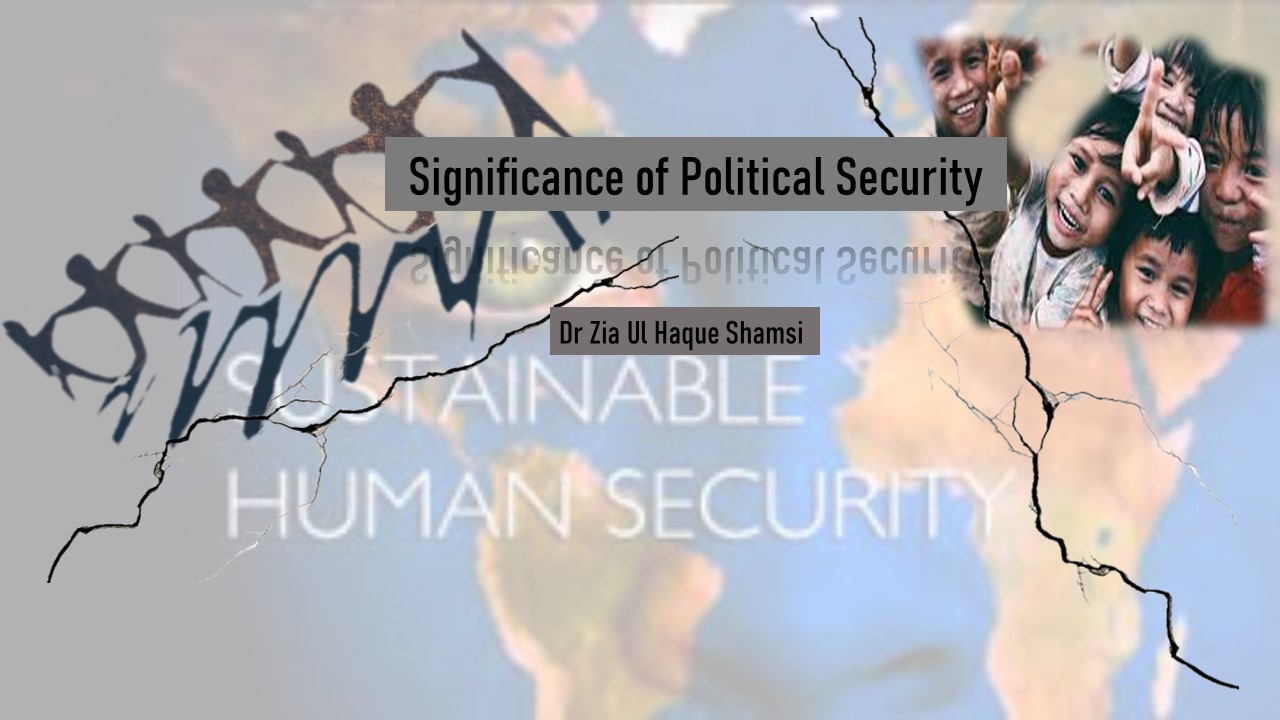According to Human Development Report 1994, “New Dimensions of Human Security,” which was prepared by the Committee headed by a renowned Pakistani economist Dr Mahbub ul Haq, the elements of human security include economic security, food security, health security, environmental security, personal security, community security, and political security. Following the technological developments and information revolution, cyber security and financial security are also considered an essential element of human security, and ultimately, the national security of Pakistan. Moreover, international institutions have been actively contributing towards the improvement of human lives, particularly in developing countries through guidelines on education, health, and sustainable development.
This article is aimed at deliberating on the significance of political security for human security, which forms an essential part of the national security of any independent and sovereign state. The 1994 UNDP Report lays emphasis on the protection of human rights and the well-being of all people as part of political security. It also aims to ensure that people are well protected from repression by the state. States, according to Charles Tilly, at times act as protection rackets and usurp the peoples’ rights of speech, press and voting. Tilly argued that, “the emerging nation-state established itself by acting, essentially, as a racketeer (in terms of the interrelated activities of war-making, state-making, protection, and resource extraction via plunder, taxes, etc.).”
The political security of any state has a direct bearing on all other elements of human security. For instance, the personal security of a citizen would remain in question if he does not enjoy the freedom of speech, press, and voting. Moreover, personal insecurity for the want of political security may lead to instability, thus putting stress on all elements of human security. Likewise, human rights abuses, which are a fundamental threat to political security, catch the attention of international institutions and may put sanctions on states, in case of large-scale violations. This may also expose the state to exploitation by adversaries and become an easy target of hybrid war. Thus, ensuring personal security and community security becomes extremely important elements of human security for the accomplishment of political security.
While emphasising the significance of political security as an important element of human security, it is necessary to highlight its linkages with economic security. States which are dependent on donor agencies for their development and sustenance cannot make independent decisions for the well-being of their people. Such states remain under stress for the provision of political security to their people. Developing nations, which are economically dependent on donor agencies, may fall into the category of states which are not politically secure and cannot endure political shocks due to economic instability.
The political turmoil in Sri Lanka is a case in point – a state that on 12 April 2022, declared “default on its $51 billion foreign debt.” According to an Aljazeera report dated 7 April 2022, “The tourism-reliant island nation faces one of its worst financial and political crises.” In fact, it was an economic crisis that led to political turmoil, and the cost of living became “unbearable for many.” There have been massive protests across the country for many weeks. The International Monetary Fund had declared that the public debt had hit “unsustainable levels.”
Travel and tourism in Sri Lanka contribute some 12% to its GDP, however, the present political crisis is likely to adversely affect the tourism sector which would further complicate the economic crisis. It is evident that economic dependency is causing political insecurity in Sri Lanka, thus, compromising nearly all elements of human security and, in turn, its overall national security.
Pakistan must also exercise extreme care in dealing with issues that are causing political insecurity for want of economic security, personal security, and community security. Rising inflation and currency devaluation have put a lot of stress on the common man and the same may be exploited by our adversaries to create fissures in society. Hence, the emphasis laid on human security and the well-being of the people in the recently released National Security Policy (2022-2026) is a step in the right direction. Pakistan must strive to ensure proper implementation of the NSP so as accrue its benefits for the state and its people
Dr Zia Ul Haque Shamsi is the author of ‘Nuclear Deterrence and Conflict Management Between India and Pakistan’ and ‘South Asia Needs Hybrid Peace.’ He is presently working as Director (Peace and Conflict Studies) at the Centre for Aerospace & Security Studies (CASS), Islamabad, Pakistan. The article was first published in Daily Times.He can be contacted at: cass.thinkers@gmail.com




